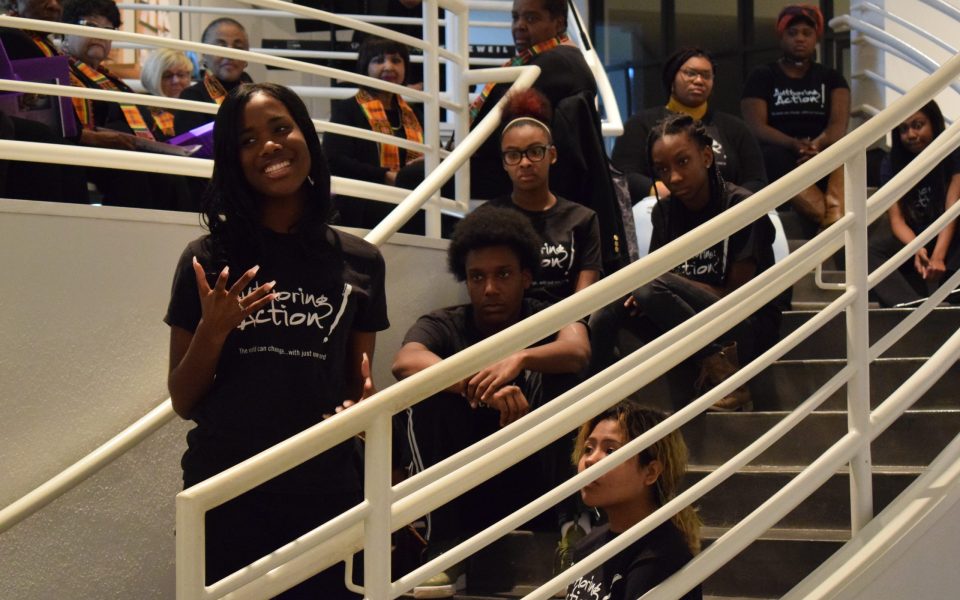More than 50 people found church in the art center as 12 teenagers and adolescents with Authoring Action performed spoken-word pieces from a descending stairwell and the Voices of God’s Children gospel choir sang African-American spirituals one floor above a captivated audience seated in bright white fold-out chairs.
The youth ensemble wrote poems in response to Sonya Clark’s exhibit, Entanglements, which is currently housed in the main gallery of the Southeastern Center for Contemporary Art. Clark, who is of African, Caribbean and Scottish descent, works primarily as a fiber artist exploring the way hair continues to negotiate race, class and gender in America and the African diaspora. Novel combinations of kinky hair and black plastic combs are common physical mediums in her most recent work on identity.
The young poets and choir took turns performing, the former speaking of hot combs and journeys to self-acceptance and the latter singing hymns about chariots and chains. Clark’s small sculpture “Sugar Eye” (2016) gazed down upon visitors from a tall wall on the left. The triangle-framed eye on a matte-black background symbolically represents the Eye of Providence featured on the US dollar bill, a reminder that God is watching. In the context of the exhibit’s themes, Clark seems to intimate that this God casts judgement upon America’s history of chattel slavery, the grotesque institution that spurred the growth of the nation’s robust economy and the trade of bills still manufactured with three-fourths cotton.
Relatedly, “Triangle Trade” (2014) is a stark reference to the trans-Atlantic slave trade, also known as the triangle trade because of common oceanic shipping routes. More than 5 feet tall and wide, the arresting canvas-backed piece is a maze of large concentric triangles densely outlined in black cotton thread. There is only a narrow and singular path to the center, though, where the thread is entwined to resemble a hair-like, braided knot that protrudes from the canvas.
Few works in this iteration of Entanglements focus so explicitly on slavery, though; most focus on contemporary practices and motifs with occasional references to Yoruban cultural traditions.
“Toothless” (2015), for instance, is a cascading waterfall of broken combs bound with black zip ties, useless and tossed aside. The piece’s title at once alludes to the phases of birth and death, and the work prompts reflection on generational cycles of discrimination and poverty.[pullquote]View Sonya Clark’s work at SECCA (W-S) through Jan. 7 or learn more about the exhibit at secca.org.[/pullquote]
“I remember when I was younger my mom would use those combs and they always used to break, and I’d have little pieces of the comb stuck in my hair,” said 15-year-old Mikari Sims, one of the Authoring Action performers. “I decided to relax my hair when I was 6 years old and just went natural this year when I chopped it all off.”
A photograph from Clark’s Hair Craft Project features the back of a woman’s head whose natural hair is braided in tight spirals, prepared for a sew-in, braids, or other protective style against a bold red background and beside the woman who braided her hair. The image represents the current stage of Sims’ hair journey since the big chop and inspired her writing.
“We don’t really get to discuss our hair a lot so it made me feel very powerful to share here with others how I feel about my hair,” Sims said.
Unsurprisingly, she and others expressed a strong connection with one of Clark’s more experimental works, like a Remington 7 Noiseless typewriter with kinky hair affixed to each of its keys. Clark replaces the English letters with a self-devised alphabet consisting of 26 variations of tiny hair coils. She typed six poems by African-American women, including “Naturally” by Audre Lorde and “at the hairdresser” by Gwendolyn Brooks.
“I came with Rosa Johnson, Maya Angelou’s niece… so with the poetry it was overwhelming,” said 32-year-old Aileen Imana, the mother of 11-year-old spoken-word poet, Saudia. “We’re a hair family, a family of women and we go through dozens of these combs, of braids and weaves and vitamins and that’s all here. This was everything to me. This was therapeutic for the performers, for the audience… and it had to be therapeutic for Sonya Clark.”

Join the First Amendment Society, a membership that goes directly to funding TCB‘s newsroom.
We believe that reporting can save the world.
The TCB First Amendment Society recognizes the vital role of a free, unfettered press with a bundling of local experiences designed to build community, and unique engagements with our newsroom that will help you understand, and shape, local journalism’s critical role in uplifting the people in our cities.
All revenue goes directly into the newsroom as reporters’ salaries and freelance commissions.


Leave a Reply